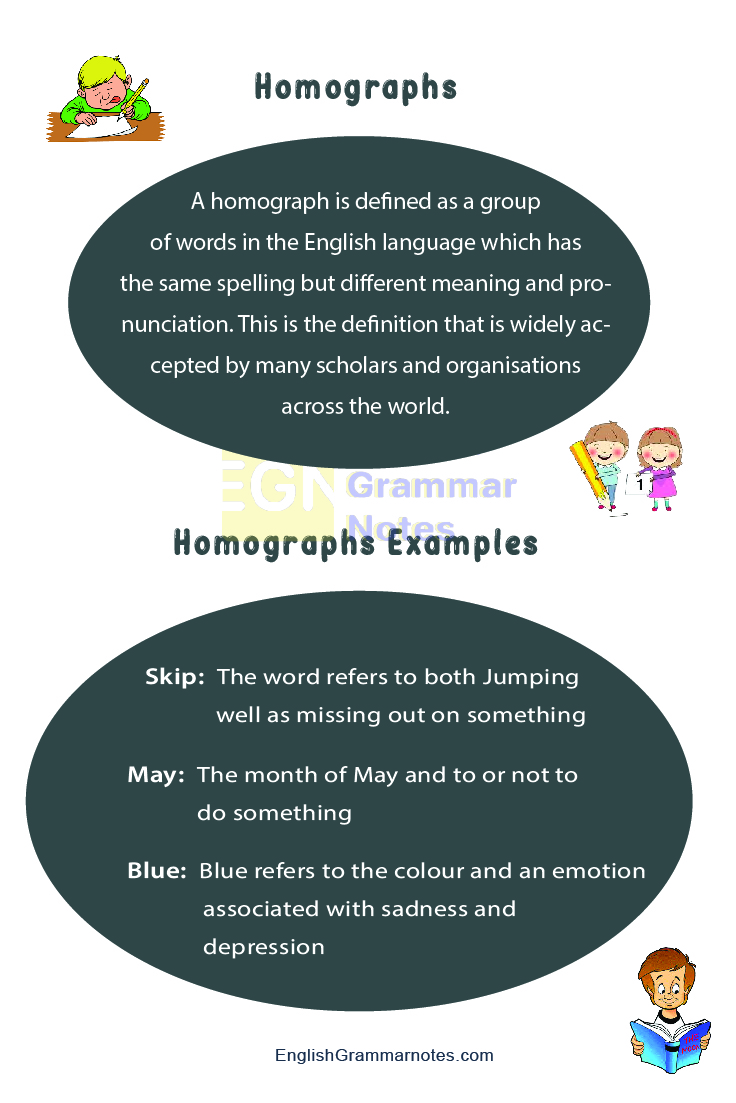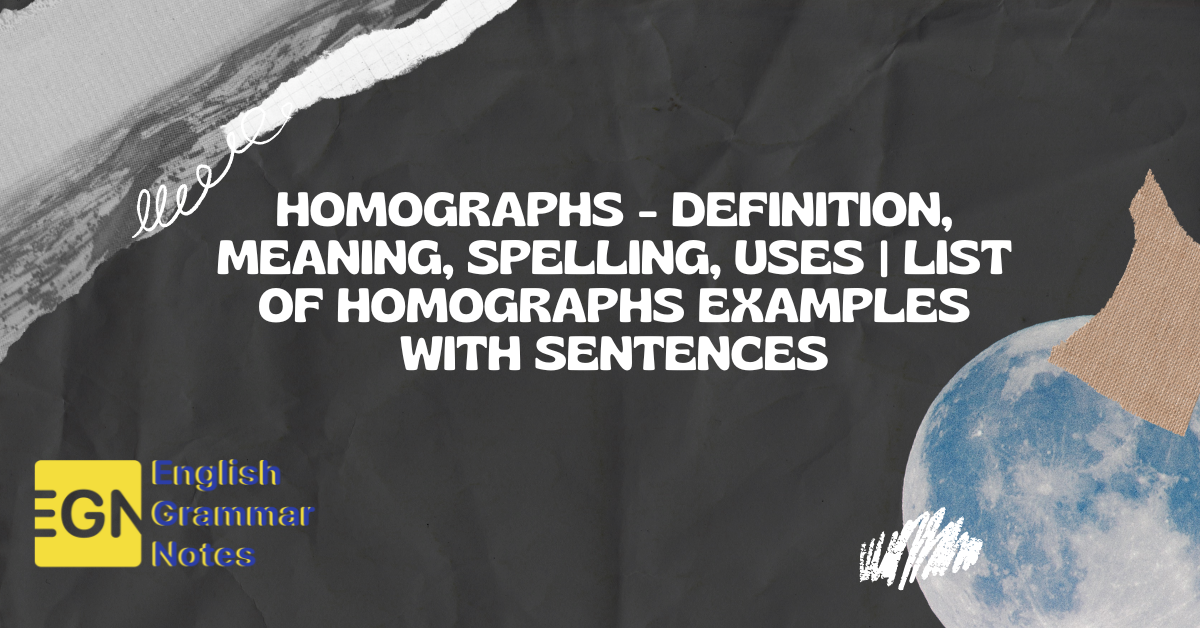Homographs are a group of words in the English language that are spelt the same but have different meanings and pronunciations. However, for two words to be Homographs, their meanings have to be different but the pronunciation can or cannot be the same. Few organisations define Homographs based on different pronunciations and few others define them based on the same pronunciation. There is no set definition for the same.
- Homographs Definition & Meaning
- Homographs Examples List
- How to Teach Homographs to Kids?
- Uses of Homographs
- What are Homographs?
- Are Homographs and Homophones the same?
- Where are Homographs used?
Homographs Definition & Meaning
A homograph is defined as a group of words in the English language which has the same spelling but different meaning and pronunciation. This is the definition that is widely accepted by many scholars and organisations across the world.
The Oxford guide and dictionary and Oxford Guide to Practical Lexicography have categorised Homographs into different categories, based on sameness and differences in pronunciation. Basically what the Oxford guide to practical lexicography says is that if two words have different meanings but have the same spelling and different or same pronunciation, then they are called homographs.
Homographs Examples List
Below, we have provided some examples of Homographs along with their meaning for a better understanding of the concept. This particular example of Homographs can be used by students for their assignments, homework, project work, class work or just for a basic understanding of the nuances of the English language. Below are 20 examples of Homographs along with their meanings:
Skip: The word refers to both Jumping as well as missing out on something
- “She won first place in the school annual skipping competition”
- “I had to skip lunch due to a hectic work schedule “
May: The month of May and to or not to do something
- “My birthday is on the 8th of May, 1994”
- “I may have to study for the whole night if I have to pass my exam tomorrow “
Pen: A small area in which animals and birds are kept and an instrument that is used to write
- “The animals that were kept away at the pen were not as healthy as the ones that are free in the wild”
- “I had to make a signature in the bank using a borrowed pen from a stranger”
Blue: Blue refers to the colour and an emotion associated with sadness and depression
- ” The sky looked particularly blue today”
- “He looked blue after his father passed away in an unfortunate car accident”
Bag: To secure or obtain something and an instrument that is used to store things
- “He bagged first place in all India painting competition
- “The jewellery was stolen right from the bag”
Lean: To rest against a wall and thin and pale
- “One should never lean on the wall of a moving bus to avoid accidents”
- “The athlete who won to race was lean and fit”
Type: To write something on a phone or a keyboard and classification of things into categories
- “He types fast on one of the oldest keyboards”
- “The type of food that we are planning to have tonight is unique and very different from our regular cuisine”
Miss: To overlook something and a title to address females
- “I had to miss the bus due to heavy traffic along with rains in Pune”
- “Miss, could you please take your seat in front of you?”
Axes: An instrument used by lumberjacks to chop down trees and a plane in a graph
- “The axe that he used to chop down the tree in front of his house is as huge as the ones used by professional lumberjacks”
- “The four quadrants in a graph are divided by x and y axes uniformly
Content: To be satisfied with something and things that are contained inside something
- “He was content with his life even though his income was less than his friends and family”
- “The content in the power point presentation was right one what we wanted and I think the client was impressed by it”
Evening: Making things even and late afternoon or just before dusk
- “Could you please even out the surface? it looks odd”
- “Samosa with chai is the perfect evening snack in our office every day”
Proceeds: To advance or go ahead with something and profit margins that are earned or gained
- “The judge proceeded with his judgement of life imprisonment for the rape accused”
- “The proceeds for this quarter are far below our expectations and can affect our fiscal revenues this year”
Second: One sixty-eth of a minute and a position that is secured after the first
- “For a second, I thought we lost the dog. But alas, he was just hiding behind the tree”
- “He secured the second position in the running race competition”

Tear: To rip something or a drop of water from the eye
- “I had to tear the entire answer paper since it was wrong”
- “Tears fell down his eyes as he saw his parents after 4 long years”
Desert: A vast area of land or a feeling of loneliness and solitude
- “The camels in the deserts of India can stay without drinking water for weeks together”
- “He particularly felt deserted after all his friends abandoned him in the middle of the academic year”
Also, Read:
How to Teach Homographs to Kids?
The following are some of the ways to teach Homographs to kids:
- Homework: Students can be given a task to identify Homograph words within their house and come back to class after 3 to 4 days. Each student will have to come up with 10 such pair of words and share it with the entire class.
- Classroom Simulations: Students in classrooms can be divided into a group of 4 or 5 and given certain tasks to compete with each other in groups. Simulations such as the usage of props to make models out of Homograph words, design of charts to outline different Homographs, etc. Teachers can grade each of the group’s work. This is going to be both interesting and fun activity for students
- Games: The most popular Indian game, Dumb Charades can be played by enacting Homographs words. This particular game can be played both in groups as well on an individual basis. Also, this game can be played both at home and at school
Uses of Homographs
The following are the areas where the understanding of Homographs can be made use:
- Framing proper sentences that are going to help in written examinations assignments homework and project works
- Good communication and a strong hold on vocabulary will help make a positive impression in interviews and public speaking areas
- Plenty of competitive exams such as CAT, MAT, and GMAT will demand good usage of the English language and the understanding of homographs can come in handy in such examinations.
Are you doubting your English grammar skills? Want to improve them from the experts? Grab the chance to check the English Grammar Notes for free from this available link and enhance your knowledge of English grammar.
FAQs on Homographs
Homographs are a group of words in the English language that have the same spelling but different meanings and pronunciations
2. Are Homographs and Homophones the same?
Homographs are different from Homophobes. Homophones will have the same pronunciations but different meaning
Homographs can be effectively used in writing as well as oral communication in school, office and personal interactions
Conclusion
It will be very useful for students and working professionals to know the different nuances of the English language such as Homophones and Homographs. Usage of words such as these in framing sentences is going to help one score extra brownie points in professional environments. The article has aimed at providing a comprehensive idea of Homographs which includes the meaning of Homographs, usage of Homographs and examples of Homographs.
